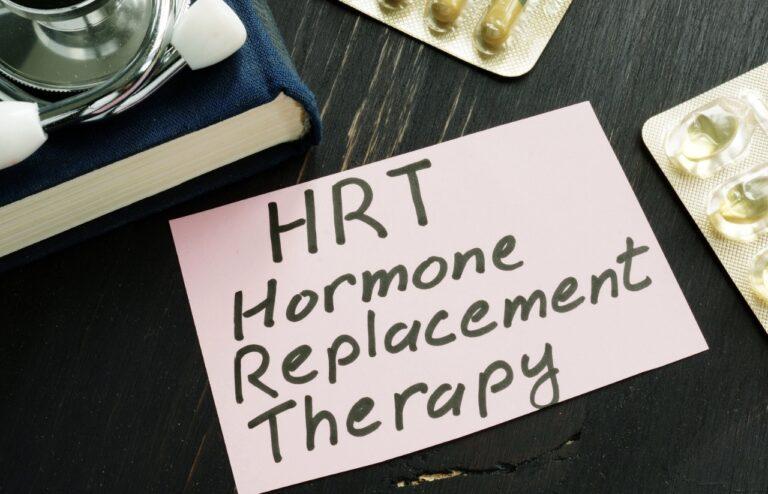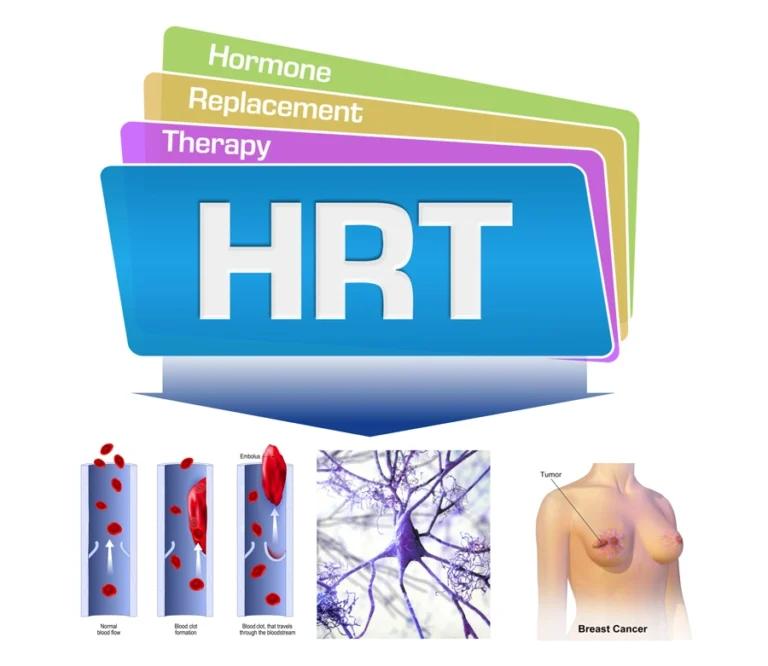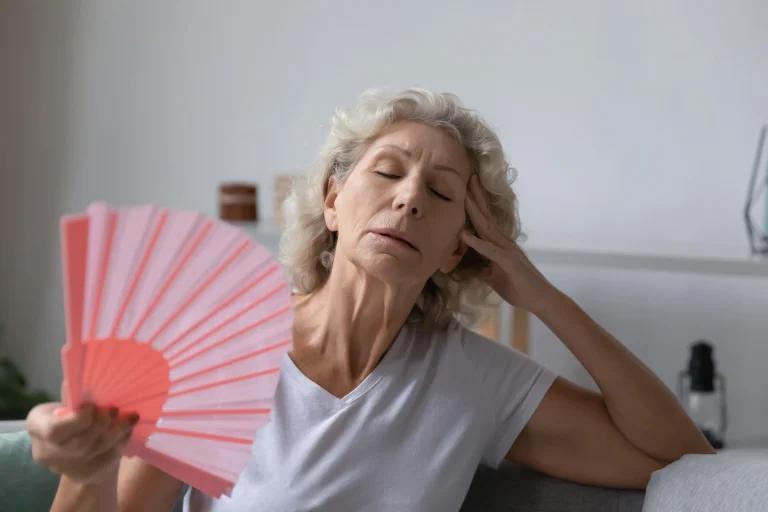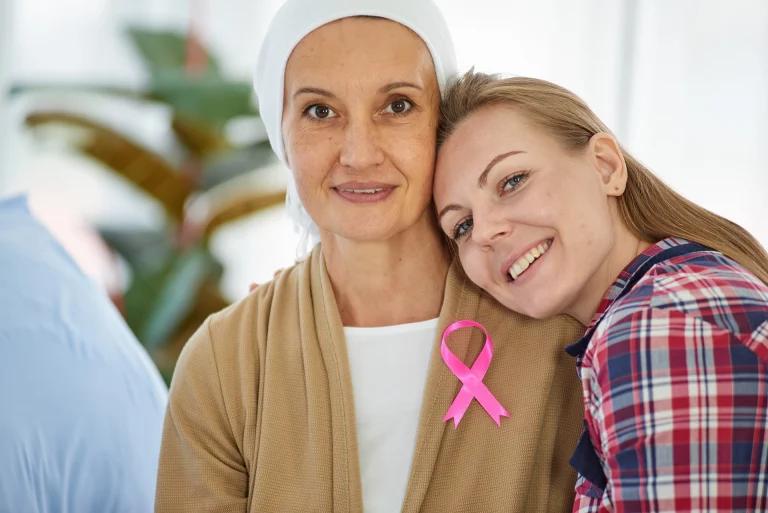
October 15, 2025 (Current Version)
March 28, 2025
Menopause is a natural phase in a woman’s life when her ovaries stop producing eggs and the levels of hormones like estrogen and progesterone decline. Many women experience uncomfortable symptoms during this time, such as hot flashes, hot flushes, and vaginal dryness. Hormone replacement therapy (HRT) is a treatment option that involves taking hormones to alleviate these symptoms and address long-term health concerns like bone loss. However, there has been ongoing debate regarding the potential link between the use of hormone replacement therapy and an increased risk of cancer, particularly breast cancer.
Understanding hormone replacement therapy (HRT)
HRT, also known as menopausal hormone therapy, is a treatment that involves replacing the declining levels of estrogen and progesterone in a woman’s body during and after menopause. There are different types of HRT available, including combined HRT (estrogen and progestogen) and estrogen-only HRT. Tibolone, a medication similar to HRT, is also used in managing menopause symptoms. HRT can be delivered through various methods, including pills, patches, gels, creams, and vaginal rings.
The benefits of HRT are to alleviate menopausal symptoms like hot flashes, night sweats, and vaginal dryness. It can also help prevent osteoporosis, a condition characterised by weakened bones. However, the decision to undergo HRT should be made after carefully considering the potential benefits and risks associated with the treatment, your symptoms of menopause and any risk factors you have.
The link between HRT and breast cancer
Numerous studies have explored the association between HRT and breast cancer risk. While the exact relationship is complex and multifaceted, the consensus is that HRT use is associated with a modest increase in the risk of breast cancer, particularly among older women. However, the specific risks vary depending on factors such as the type of HRT, duration of use, and individual characteristics.
Estrogen-progestogen therapy
Estrogen-progestogen therapy, which combines estrogen and progestogen, is associated with a higher risk of breast cancer compared to estrogen-only therapy. Studies have shown that long-term use of estrogen-progestogen therapy is linked to an increased risk of breast cancer, especially when used for more than five years. However, the risks tend to decline once HRT is discontinued.
Estrogen-only therapy
Estrogen-only therapy is typically prescribed to women who have undergone a hysterectomy, as the risk of endometrial cancer is eliminated in these cases. Estrogen-only therapy has been found to have a lower risk of breast cancer compared to estrogen-progestogen therapy. However, it is still associated with a slight increase in breast cancer risk, particularly when used for a longer duration.
Recent research findings
A recent study conducted in the UK aimed to provide updated estimates of breast cancer risks associated with different HRT preparations. The study confirmed that HRT use, particularly estrogen-progestogen therapy, is associated with an increased risk of breast cancer. However, the risks were found to be lower than those reported in a previous meta-analysis that combined the results of multiple studies.
The cancer research study also highlighted that the risks decline more noticeably after discontinuing HRT. This finding provides some reassurance for women who may be concerned about the potential long-term risks associated with HRT.
Factors influencing cancer risk and HRT
Several factors influence the association between HRT and breast cancer risk. These factors include the type of HRT used, the duration of HRT treatment, the age of the individual, and their general health.
Type of HRT
Different types of HRT have varying effects on breast cancer risk. Combined HRT, which includes both estrogen and progestogen, has a higher impact on breast cancer risk compared to estrogen-only HRT. Among combined HRT, the type of progestogen used can also influence the level of risk, with norethisterone associated with the highest increase in risk and dydrogesterone with the lowest risk.
Duration of HRT treatment
The duration of HRT treatment plays a crucial role in breast cancer risk. The longer the duration of HRT use, the greater the risk. However, it is important to note that the risks start to decline once HRT is discontinued. For women who have taken combined HRT for less than five years, there is no increase in breast cancer risk five years after stopping the treatment.
Age and general health
A woman’s age and general health also impact the association between HRT and breast cancer risk. Women in their 50s generally have a lower risk compared to those in their 60s and 70s. Additionally, factors such as obesity and starting HRT after the age of 60 can attenuate the risks associated with HRT use.
Making informed decisions about HRT
Determining whether to pursue HRT should be a personalised decision made in consultation with a healthcare provider. The decision should take into account individual factors such as age, overall health, menopausal symptoms, and personal preferences. It is essential to weigh the potential benefits of symptom relief and long-term health protection against the potential risks, including the increased risk of breast cancer.
Considering alternative options
For women who choose not to undergo HRT or are unable to use it due to medical reasons, alternative options are available to manage menopausal symptoms and reduce the risk of conditions like osteoporosis. Lifestyle modifications, such as regular exercise, a balanced diet rich in calcium and vitamin D, and maintaining a healthy weight, can contribute to overall well-being during menopause.
Non-hormonal medications, approved by the FDA, may also be considered to alleviate specific symptoms. For instance, fezolinetant and paroxetine are approved to treat moderate to severe hot flashes, while ospemifene is used to address pain during sexual activity due to menopause-associated vaginal changes.
Additionally, complementary and alternative therapies, such as phytoestrogen-containing remedies derived from plants, have been explored for symptom relief. However, the long-term safety and efficacy of these natural products require further investigation.
Tips for reducing cancer risk
Apart from considering HRT, there are other measures individuals can take to reduce their risk of breast cancer and other types of cancer. Incorporating the following habits into daily life can contribute to overall well-being and lower the risk of cancer:
- Maintain a healthy lifestyle: Eating a balanced diet, engaging in regular physical activity, and avoiding tobacco use can greatly reduce the risk of cancer
- Manage weight: Maintaining a healthy weight can lower the risk of various types of cancer, including breast cancer. It is important to strive for a healthy body mass index (BMI) and adopt healthy eating habits
- Limit alcohol consumption: Excessive alcohol consumption is linked to an increased risk of breast cancer. It is advisable to limit alcohol intake to reduce the risk
- Regular check-ups: Regular screenings and check-ups can help detect cancer at an early stage, increasing the chances of successful treatment
- Stay informed: Stay updated on the latest research and recommendations regarding breast cancer prevention. This will enable you to make informed decisions about your health
Conclusion
HRT can be an effective treatment for some women with menopausal symptoms, help prevent conditions like osteoporosis, and improve quality of life. However, it is important to be aware of the potential health risks, including a slight increase in the risk of breast cancer. The decision to undergo HRT should be made after careful consideration of individual factors such as family history of breast cancer or blood clots, consultation with a healthcare provider, and a thorough understanding of the benefits and potential risks associated with the treatment. By making informed decisions, women can strike a balance between symptom relief and long-term health protection during the menopausal transition.
Sources
- Does HRT increase risk of cancer? – Cancer Research UK
- HRT and breast cancer risk: varies with type and duration of HRT
- Type and timing of menopausal hormone therapy and breast cancer risk: individual participant meta-analysis of the worldwide epidemiological evidence
- Study provides new estimates of breast cancer risks associated with HRT – BMJ
- Menopausal Hormone Therapy and Cancer – NCI
- Menopausal Hormone Therapy and Cancer Risk – American Cancer Society
Medical Disclaimer
NowPatient has taken all reasonable steps to ensure that all material is factually accurate, complete, and current. However, the knowledge and experience of a qualified healthcare professional should always be sought after instead of using the information on this page. Before taking any drug, you should always speak to your doctor or another qualified healthcare provider.
The information provided here about medications is subject to change and is not meant to include all uses, precautions, warnings, directions, drug interactions, allergic reactions, or negative effects. The absence of warnings or other information for a particular medication does not imply that the medication or medication combination is appropriate for all patients or for all possible purposes.









